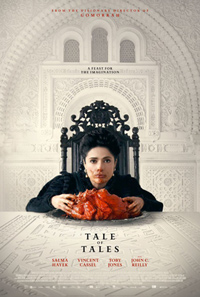Good Gaud: Garrone’s Critique of Aristocracy Goes Barely Skin-Deep
 Italy’s film industry is enjoying something of a renaissance lately, though honestly it’d have to be in order for Matteo Garrone to pull together the dough that must have been necessary to craft this exorbitant fairy tale triptych. Lurid, lush, and ludicrous, Tale of Tales works from Giambattista Basile’s 17th century collection of fairy tales of the same name, illustrating the ridiculous and superficial gloom of the ruling class. Skin and its mutilation is a major motif here, though that ultimately becomes ironic given that Garrone rarely gets below the surface of these curious concoctions.
Italy’s film industry is enjoying something of a renaissance lately, though honestly it’d have to be in order for Matteo Garrone to pull together the dough that must have been necessary to craft this exorbitant fairy tale triptych. Lurid, lush, and ludicrous, Tale of Tales works from Giambattista Basile’s 17th century collection of fairy tales of the same name, illustrating the ridiculous and superficial gloom of the ruling class. Skin and its mutilation is a major motif here, though that ultimately becomes ironic given that Garrone rarely gets below the surface of these curious concoctions.
Promising grand ambitions and absurdities from the opening minutes, the first tale begins with King of Longtrellis (John C. Reilly) trying to capture the heart of a sea monster so that it can be cooked by a virgin and eaten by his Queen (Salma Hayek), thus making her pregnant. After she gives birth the very next day, the film jumps ahead sixteen years, when her albino son Elias (Christian Lees) longs to reunite with his peasant twin (Jonah), who was born of the virgin who fatefully cooked the heart. Other tales involve haggard elderly sisters trying to trick King of Strongcliff (Vincent Cassel) into sleeping with them, and Princess Viola trying to escape from her ogre husband, to whom she was forced to marry after he correctly guessed that a large strip of animal hide came from the corpse of a flea.
As evidenced by even a cursory synopsis, Tale of Tales is out and out ridiculous. And for most of the time, it gets by on the sheer amusement involved in waiting to see what sort of crazy development will pop up next. Entertainment value, it does not lack. But as the three tales come to their gruesome conclusions, and their themes crystallize into familiar forms, one is left asking if that’s all there is. The abrupt and rushed resolution of one tale in particular suggests that Garrone was more interested in the ride than the destination.
As a technical showcase, it’s never not opulent. Peter Suschitzky beautifully captures Dimitri Capuani’s rococo furnishings, on which he no doubt spent every dime he was offered; and Alexandre Desplat contributes a sweeping, very Desplatian score that notches up the grandeur further still. Had more resources gone toward the script department (which consists of no less than four individuals), perhaps the other failings wouldn’t have been so egregious, and this really could have lived up to its aggrandizing title.
Reviewed on May 13th at the 2015 Cannes Film Festival – Main Competition – 125 mins.
★★½/☆☆☆☆☆


